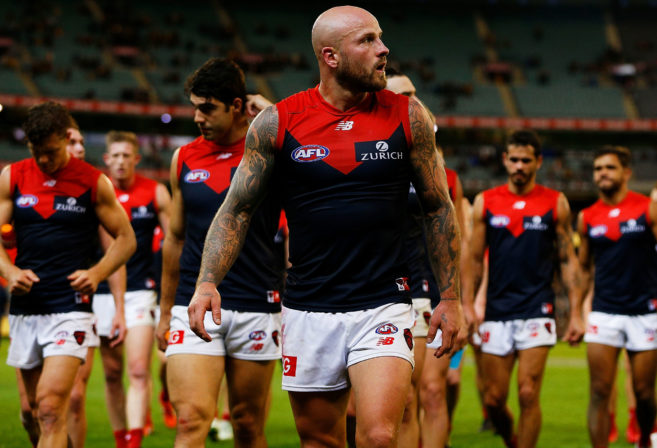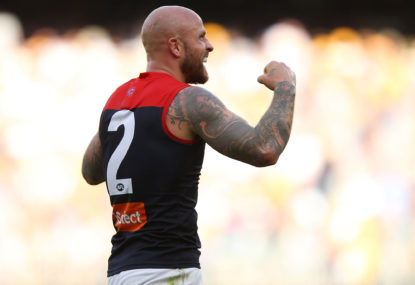The year was 2006.
John Howard was our Prime Minister, George W Bush was the President of the United States, Tony Blair was the Prime Minister of the United Kingdom and Melbourne had just hosted the Commonwealth Games, the largest sporting event to be held in the city for half a century.
Roger Federer won three major titles that year, with the other going to Rafael Nadal who snared his second French Open title by defeating Federer in their first Grand Slam final against each other.
Italy took out soccer’s World Cup, defeating France in a final marred by Zinedine Zidane’s headbutt on Marco Materazzi, while in the cricket, Australia was about to begin a campaign to regain the Ashes which had been lost to England the previous year.
On the AFL field, the Sydney Swans and West Coast Eagles engaged in the second of their two classic grand final duels, while Adam Goodes won his second Brownlow Medal and Brendan Fevola won his first Coleman Medal.
It was also the last year that Melbourne made the finals. After defeating St Kilda in an elimination final at the MCG, the Dees lost to Fremantle by 28 points at the soon-to-be-demolished Subiaco Oval on a Friday night in September, six years to the day since the Sydney Olympics were opened.
The side that night featured captain David Neitz, as well as Brad Green, Colin Sylvia, Aaron Davey, Travis Johnstone, Adem Yze and 2004 Norm Smith Medallist Byron Pickett.
Also featuring in that side was 18-year-old rookie Nathan Jones, who was playing in just his eighth game after debuting against the Western Bulldogs at the MCG in Round 17 that season.
Now 30 and with over 250 games under his belt, the co-captain of the present side is the only player remaining who played in that match, and since then he and the club have gone through hell and back again.

(Photo by Daniel Pockett/AFL Media/Getty Images)
In the intervention, the club has endured crisis after crisis, including, among other issues:
• botched draft selections, including the number one pick in 2008, Jack Watts, who failed to live up to expectations in his nine years at the club;
• the sacking of two untried coaches – Dean Bailey and Mark Neeld – in 2011 and 2013 respectively;
• numerous heavy defeats, the worst of which was a 186-point mauling by the Geelong Cats which resulted in Bailey’s dismissal;
• the botched appointment of Jack Trengove and Jack Grimes, who had only played 69 games between them, as co-captains in 2012;
• the death of much-loved club president Jim Stynes that same year; and
• the tanking scandal which cost the club more than $500,000.
With the club at rock bottom, Peter Jackson was appointed CEO in April 2013 and set about rebuilding the club from the bottom up, and this included removing key personnel and putting into place templates for future success.
After then-coach Neeld was removed from his post midway through the season, the club’s focus turned to former Sydney Swans coach Paul Roos, who led the side to a drought-breaking premiership in 2005.
After months of denials and speculation, Roos’ appointment on September 6, 2013, was to mark the first major milestone in the rebuild of the club.
His priority wasn’t to return the club to the finals, but rather to map out a path for success, coaching the side for a fixed term before handing the reins to someone else.
He embraced the challenge head-on, leading the club to four wins in 2014, seven in 2015 and then ten in 2016. In each of those seasons, their percentages improved to 68.4, 77 and 97.6 respectively.
He was also able to get the best out of key players such as Nathan Jones, whom Roos appointed as co-captain in 2014 alongside Jack Grimes, as well as Jack Watts, Tom McDonald, Jesse Hogan, Clayton Oliver and Jack Viney, among many others.
Jones, in particular, had become a shining light in a very dark period for the club, winning the best-and-fairest in 2012 and 2013 (and again in 2014).
It was obvious that he had good leadership skills, but this was something Mark Neeld had overlooked when he re-appointed Jack Trengove and Jack Grimes as co-captains prior to the 2013 season.
Weeks prior to his sacking that season, Neeld had continually been grilled as to why he didn’t appoint Jones as captain in some capacity.
“When all the boys’ peers sat down, for two years in a row, Jack [Trengove] and ‘Grimesy’ have been the two at the top of the tree,” he said in May 2013, a month before his dismissal.
“Nathan [Jones] and Colin [Sylvia] have shown significant leadership improvement, but Jack Grimes and Jack Trengove are the two best leaders on our playing list, and that’s where it is at.”
After Paul Roos was appointed as coach, he wasted little time in appointing Jones as co-captain with Grimes ahead of the 2014 season.

(Photo by Paul Kane/Getty Images)
Jones then assumed the sole captaincy after Grimes relinquished the role at the end of that season, and led from the front as the club continued to take little but significant steps forward in their progress.
It was also at this time that the club appointed the man who would succeed Roos at the end of his term in Simon Goodwin, then an assistant coach at Essendon.
While the club started to make progress on the field, Goodwin was being heavily trained so the transition to him from Roos would be as smooth as possible.
This included coaching the side during the 2016 NAB Challenge and being given more responsibilities on game day.
Once Roos’ term was formally complete at the end of 2016, Goodwin took full control of the side and led them to a ninth-place finish in his first season with twelve wins, ten losses and a percentage of 105.2 per cent.
With one round to spare in the current season, the club’s win-loss ratio of 13-8 and percentage of 129.8 (the second-best in the competition behind Richmond), all but ensures it will play finals for the first time since 2006.
The club made sure of its berth in September by defeating the West Coast Eagles by 17 points at Optus Stadium yesterday, but it didn’t come without its nervy moments.
The Dees started strongly, kicking the first four goals of the game, but the Eagles came charging back in the final quarter to take a one-point lead.
Dees fans must be thinking ‘oh no, not again’, with the heartbreak of their side missing last year’s finals on percentage still fresh in their minds.
However, the Dees would kick the final three goals of the match to register their 13th win of the season and all but book their first finals ticket in twelve long and excruciating years.
Significantly, it was their first win over a side ranked above them this season, and it came in style, defeating a side which had a faint hope of snatching the minor premiership from Richmond with one round to go.
[latest_videos_strip category=”afl” name=”AFL”]
They can now look forward to their clash against the GWS Giants at the MCG this Sunday without any pressure on their shoulders, though they will want more than just to make up the numbers in September.
Simon Goodwin’s men still remain a faint chance of finishing in the top four, though this would require Fremantle to defeat Collingwood at home on Saturday.
That result appears unlikely, given there was a massive 184-point gap between the two sides last Saturday with Collingwood defeating Port Adelaide by 51 points at the MCG and Fremantle copping a record 133-point thrashing at the hands of the Geelong Cats at Kardinia Park.
Most realistically, though, they’ll finish in the bottom half of the eight which will mean a sudden death elimination final, but just who they will face will be determined by the results of Round 23.
What is certain for sure is that Richmond will finish on top of the ladder and will host a qualifying final at the MCG, where it is undefeated in 20 straight matches dating back to its loss to the Sydney Swans in round 13 last year.
The order of the rest of the eight remains uncertain though in what is shaping as the most exciting final round of matches in recent AFL history.
Back on topic to finish off, and Melbourne fans around Australia are no doubt celebrating after seeing their side qualify for the finals for the first time since 2006, and now it will remain to be seen how they will fare in September.
While they’ll be happy just to see their side play in a final given the pain and disappointment the club has endured over the past decade, it would be great if they can make a deep run like the Western Bulldogs did in 2016.
But regardless of how the Dees fare, making the finals will be proof enough that progress has been made in the club’s rise from being a basket case to a potentially exciting team to watch in the years to come.































































































